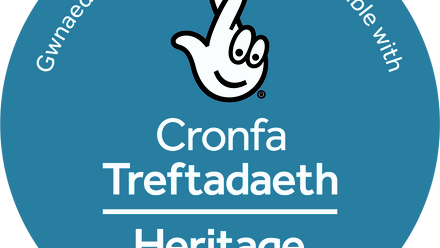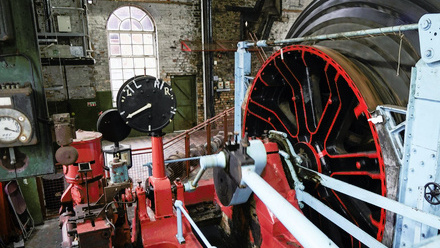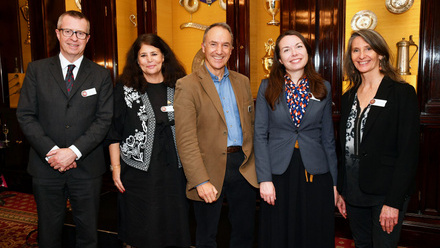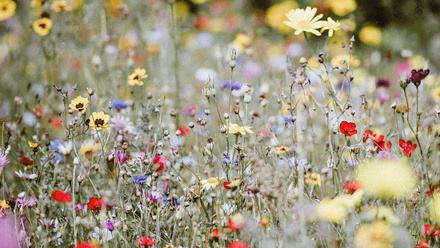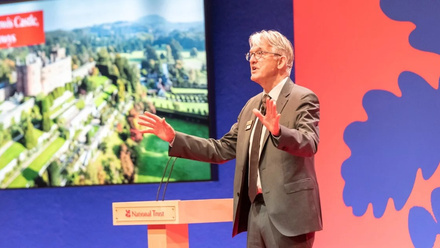We’ve all known for many years that cultural heritage is at risk from climate change and that no country is immune to the challenges of flooding, desertification, increased extreme weather events, rising sea levels etc. But perhaps there is also an assumption that cultural heritage is passive; that it is impacted by global temperature rises but has nothing to offer in return. It must simply await its fate.
The Climate Heritage Network was set up to challenge this assumption, and to show that cultural heritage organisations can play an active role in addressing the challenges of climate change. First conceived in San Francisco in 2018 and then launched in Edinburgh in October 2019, the Climate Heritage Network brings together hundreds of arts, culture, and heritage organisations across the globe. It is a truly international collaboration of likeminded organisations who are working to place cultural heritage into the mainstream of climate policy and action.
Within the membership of the Climate Heritage Network there are cultural heritage professionals and volunteers who have the skills and knowledge to support the design, planning, and execution of their communities’ climate action strategies, using cultural heritage as a physical and intellectual resource.
The Climate Heritage Network aims to empower cultural heritage officials to engage with climate change agendas and to promote climate solidarity between arts, culture and heritage agencies. We share a concern that the cultural dimension is currently missing from many national climate change adaptation and mitigation plans. However we also believe that ministries of culture are well positioned to support existing efforts by civil society to fill these gaps or indeed to lead programmes themselves.
The Climate Heritage Network also fulfils another valuable role: we offer a place to collaborate and a forum to share good practice, effective strategies and positive messages. We support communities by providing opportunities for members to learn from one another, raising awareness of what has and hasn’t worked in different parts of the world. I currently coordinate the working group that is focussed on communicating the role of cultural heritage in climate action. Our work is important because we seek to demonstrate to policymakers that cultural heritage has value as part of climate action strategies. Our overarching aim is to empower Climate Heritage Network members to find the most effective language to connect the power of arts, culture, and heritage to drive positive climate action.
Our working group activity is currently focussed on COP26 and the immediate outputs will include: an advocacy toolkit; a resource bank; and a discoverable and accessible digital library, which will collate and showcase the knowledge products and resources created by the Climate Heritage Network.
But what else can we do? How can we communicate more effectively with policymakers to amplify our messages and ensure that we deliver the very best results?
Here is a simple suggestion: we need better mechanisms for sharing research proposals, projects and other initiatives so that we create bigger and better outcomes through building on and amplifying the work of others rather than repeating and constantly reinventing the same things. Policymakers are well placed to help us find a common language, common toolkits, and common metrics. We understand that the G20 ministries of culture propose establishing a working group of experts on culture and climate change. The establishment of such a group could significantly elevate the prominence of the climate change topic in the cultural policy and is the type of mechanism the Climate Heritage Network is very keen to support.
We could also do more to inspire people through the power of example. In practical terms this means writing up high quality case studies that have genuinely replicable ideas and making them accessible in places where people can easily find the information. Too many case studies are buried deep within organisational websites or other obscure places. Do Governments therefore have a role as the go-to place for case studies? And published case studies must include clear and detailed instructions so that others can replicate or expand them. Perhaps we all need to be more generous about sharing our hard-won knowledge – both the measures that ensured that our projects were a success, or indeed those that caused them to fail.
Expanding on the topic of knowledge-transfer I would like to champion the value of awards ceremonies and offering prizes as a way to highlight good practice and to offer inspiration. The well-known European Heritage / Europa Nostra Awards are a good example and there is the future potential to place greater emphasis on celebrating projects that respond actively and positively to climate change. But perhaps an even bolder step would be to set environmental sustainability as a mandatory eligibility criterion for all cultural heritage prizes and awards.
After all our goal is to mainstream climate action into cultural heritage, and cultural heritage into climate action.
Climate action can no longer be an optional activity for cultural heritage organisations. It should be part of everything that we do and everything we talk about. As a member of the Climate Heritage Network, Icon understands the value of helping to communicate this vital ambition effectively.
Presentation given on 12 April 2021 at the G20 Italia 2021 webinar series developed by the Italian Cultural Ministry: Preserving Cultural Heritage, Supporting the Green Transition.
You can watch the three webinar sessions in full on the MIC-Italia YouTube channel. There's around 15 hours of content so we suggest using the published programme to identify the sessions that you are most interested in.

